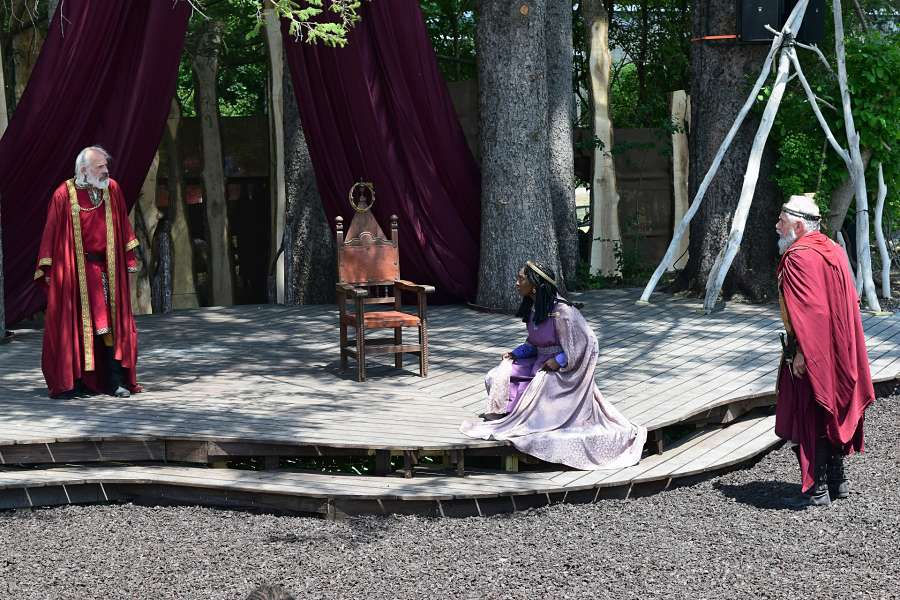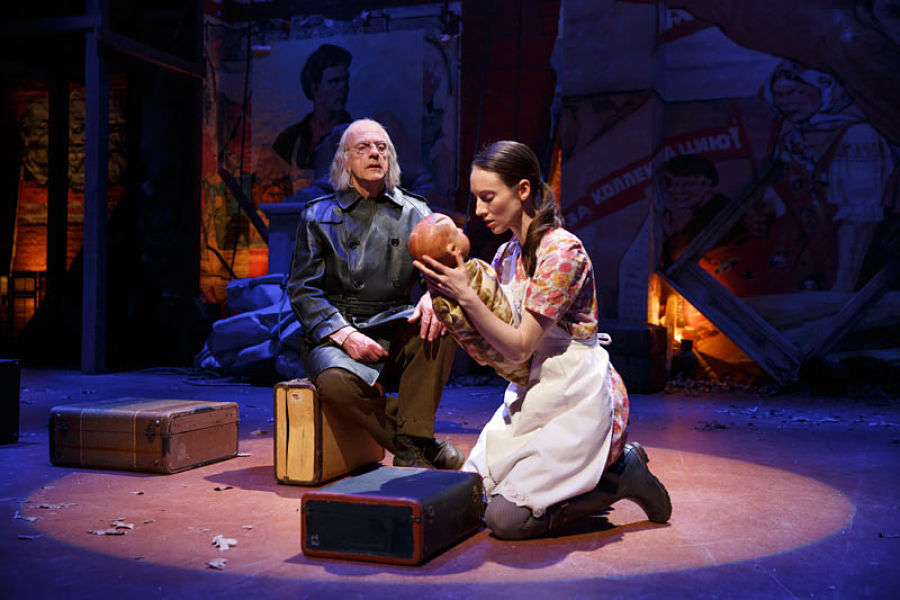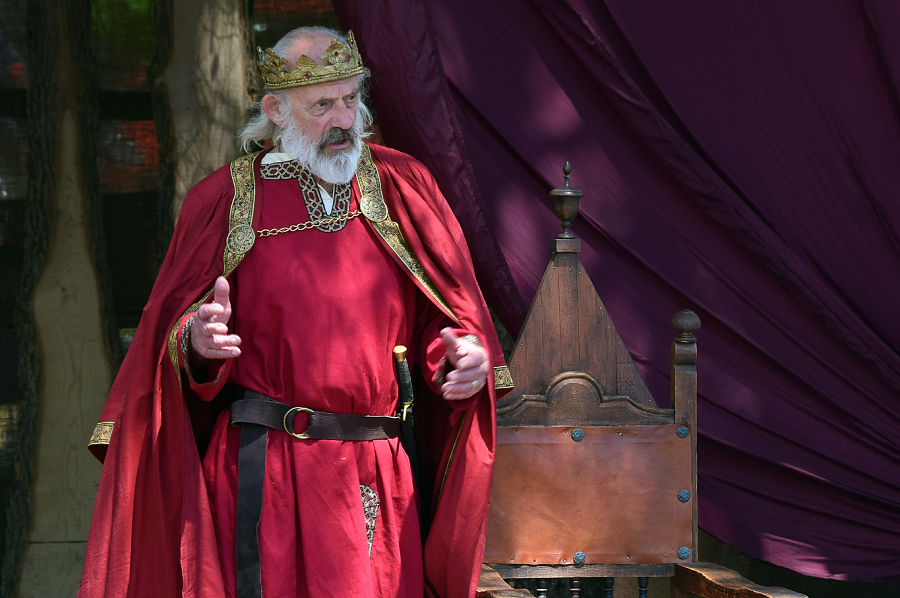Christopher Lloyd may be best known for onscreen characters: Back to the Future’s Doc Brown, Taxi’s Jim Ignatowski. But theatre has been part of his career for longer than TV or film, since his days studying at the Neighborhood Playhouse and performing at Yale Repertory Theatre, American Repertory Theater, and Playwrights Horizons, in plays by Chekhov, Brecht, Shakespeare, and more.
This weekend, Lloyd will take his final bow in Shakespeare & Company’s King Lear, the inaugural production in the company’s New Spruce Theater, an outdoor venue on their property in Lenox, Mass. The play’s title role—a demanding part that perennially attracts veteran actors—is often played by actors in their 60s, or sometimes even younger. But Lloyd has chosen to take on Lear—who does claim to be over 80—at the age of 82. The tragic role of the mad king may seem like a departure from the comic roles Lloyd is most famous for. On the other hand, Lear fits handily with a résumé of grandiose characters who command the attention of everyone around them.
The reviews for his performance have been mixed, though Wall Street Journal‘s Terry Teachout called Lloyd “magnificent” and “unutterably pitiable” in the role. In a recent phone interview, Lloyd talked about what it takes to play larger-than-life characters, how he views Lear’s madness, and which classic roles he’d still like to tackle.
EMILY ROME: You’ve been in productions of King Lear before, right? What roles did you play then?

CHRISTOPHER LLOYD: Yes. During the ’60s, I did three different productions. I played Oswald, Edmund, and the Duke of Albany. When I was Duke of Albany, I was in a production with Morris Carnovsky.
How did things come together for you to take on the lead role in this production?
Well, when I did those three productions back in the ’60s, I didn’t have any inclination to be the king himself. It just never entered my mind. It seemed like something so remote, not only in age at the time, but way beyond my undertaking. Time passed. And then three, four, five years ago—I forget how many—I woke up one day, and it was like a light bulb went off in my head, and I’m suddenly feeling like maybe I could do this. I was within the age I should be, so I kept thinking about it, looked at the play, then thought, ‘Well, who is gonna direct this?’ And eventually I became acquainted with Allyn [Burrows, artistic director of Shakespeare and Company]. He was unhesitatingly excited to do it.
This production was delayed for about a year due to the pandemic. During that time, did you continue to spend time with the text, or were things on pause with Lear?
I kept working on it. When it was postponed, we had a plan to wait until the following summer. I’m kind of grateful for myself that the delay came up, because I was a little bit underestimating what was ahead of me. The extra time really helped.
Is there anything in particular you feel you were able to bring to the role after having that extra year?
I felt somehow related to his plight at the time, and I felt that with a little luck and persistence, I might be able to reach what was required to make Lear credible and believable, for the audience to identify with his difficulties.
Many actors tackle the role in middle age or in their 60s. You’re 82. What would you say you were able to tap into that you might have missed if you’d played it at a younger age?
I feel that the age factor is important. I am “fourscore and upward,” as he describes. He’s reached the point where he’s no longer able to carry out the duties or responsibilities of a king, keeping an army intact—all of that is is becoming a struggle for him. He’s getting a little senile or forgetful, and he doesn’t have the energy he once had. He’s compelled to divide up his kingdom because he can no longer handle it himself, and he knows that. There was a time when I used to play old men—put on a long beard and makeup and everything. Now I don’t have to do that.
Beyond not needing the makeup and fake beard, do you feel like you can identify with some of the experiences of old age you’re describing?
Yeah, being the age I am, you become aware that life doesn’t go on forever. Physically, you’re not able to do the things you used to do, and mentally it becomes a little overwhelming to handle all the responsibilities that he had daily as king of the kingdom and all the details. He no longer does that well or with confidence.
With King Lear, we have a character who’s going mad, written before people had our current understanding of psychology and mental illness. What is your interpretation of the nature of Lear’s madness?
There’s the question of whether he begins the play already mad. I don’t feel he does. I feel there’s a lot of pressure, and he feels that Cordelia should nurse him, as he puts it, through the remainder of his life. And he has this contest he presents, which was a foolish thing to do, but in his insecurity, he wants to hear from each of the daughters how much they love him. And he needs love a lot. I feel he’s a man of a very military nature. He had an army that was respected, and he maintained it and was probably a vigorous and very effective warrior himself. And he no longer has the strength to maintain that. Now he’s gotta give that up.
So he wants love, and he wants it most from Cordelia. Lear’s queen, wife, the mother of his children, is barely mentioned in the play. I’ve always felt that Lear’s wife lost her life giving birth to Cordelia. I don’t feel he was a good father. He was too military and too strict and too impatient to be a good father, especially with Regan and Goneril. I think a lot of the anger from them toward him is a result of that. When Cordelia takes the stand that she does, he doesn’t know what to do. He’s at the end of his ropes, the end of his life, and everything falls apart. And his madness evolves from that—his struggle with Goneril and Regan, his loss of his favorite daughter. It all goes to hell.

I was quite taken with just how transfixed your Lear was by Poor Tom. Tell me how you crafted those scenes with Nomè SiDone as Edgar/Poor Tom.
Those scenes I still feel I haven’t got a real grasp on. That being said, I think Lear is fascinated by this sort of creature, this man and his own brand of madness. He sees kind of a kindred spirit with him, he wants to tap into his genius. He asks him, “What is the cause of thunder?” and “What is your study?” He’s looking for some answer to his own dilemmas.
Have those scenes evolved at all during the run of the show?
It’s grown more and more. Nomè’s wonderful to work with, and he gives so much. It’s extraordinary. So I’ve taken that in and tried to feel how to respond to that, how to give back with it. It’s helped me to feel like I belong in the scenes.
When you have a new project open, do you read reviews of your performance, or do you stay away from those?
Inevitably they come up. I tend to steer away from it. I don’t want to know that a reviewer of a particular publication is out there in the audience tonight. Some people maybe have a stronger will, but I don’t forget that that person is there. It’s kind of an encumbrance. I don’t want to be thinking about that. And I don’t seek out reviews unless they’re right in my face. I rely much more on a sense of how the audience is taking it, accepting it, and maybe people will come up to me and make comments afterwards. That’s important to me.
The Berkshires have been getting a lot of rain over the past month. How has it been for you be in an outdoor production of King Lear, with the storm of the play being more than just the sound effects?
I love the theatre—that space and the audience around three sides. It’s a real treat. There’s a wash of light when the sun goes down. Shakespeare’s plays were performed in the afternoon. There was no artificial lighting at the Globe Theatre. There have been a couple times when the timing of the play and the language being spoken at the moment goes with the first drops of rain. The Fool has a song he sings about the rain, “The rain it raineth every day,” [borrowed from Shakespeare’s Twelfth Night], and one time it began to rain right then.
Throughout your career, you’ve performed in projects of all sorts of different genres, from comedy to drama. Does it feel like you’re working different muscles in each genre? Or does that all feel in the same mode?
It feels kind of the same mode. I haven’t tried to steer my career towards heavy drama or comedy. I’ve let it go wherever it goes because I feel what I need to do is bring a character to life, whether he’s a Neil Simon role, say, or Lear. And to create a real character that the audience can identify with, even if they don’t like the character. Maybe they don’t want to sit down at the dinner table with that character, but I want them to be able to see that character in themselves.
One of your most iconic characters, Doc Brown, gets his West End debut in Back to the Future: The Musical this month. What sense do you have of what Roger Bart brings to that role?
My wife, Lisa, and I are going to London shortly after we finish Lear. I’m very excited to see it. I was there a few months ago when they had sort of a press preview. I really liked Bart and what he was doing and the rest of the cast. And I’m wondering about all the technological stuff—how that’s going to be presented. I know Bob Gale and Bob Zemeckis are both very into it and want to make sure the essence of that movie comes across on stage.
Meanwhile, the animated film Anastasia was also adapted to the stage recently, but your role of Rasputin was cut out. What did you think of that?
I didn’t even know there was a stage version of it. I loved doing the animated film—Rasputin is such a controversial person in actual history. That’s too bad.

Several of your memorable roles are wonderfully larger than life. You’ve said the conductor Leopold Stokowski influenced Doc Brown. There’s a throughline of grandness, of characters who seem to be conducting space and time like a full orchestra, or characters who just really command a room’s attention. Are those roles you find yourself particularly drawn to?
It’s got to be written well. It’s gotta be writing that’s inspiring and convincing where I can get the thread on it and really go for it. If the writing isn’t up to it, it’s difficult to take the material and really go all the way. But I love material where you can just go far with it.
What is your next creative project?
I’m going to do a Christmas episode for Hallmark. It’s such a different kind of story but very charming, very Hallmark. I have an offer for film work in October. So we’ll see what evolves.
What is still on your career wish list? Is there anything that you haven’t gotten to do yet that you’d like to do?
There is one thing which may sound a little presumptuous. I love Don Quijote de la Mancha, and I sometimes fantasize about a wonderful film or stage production. Well, he’s been done on the stage. A film that really brings Don Quixote to life. I think it’s a fascinating character, a wonderful character, a little crazy himself. I would just love the opportunity to do that.
Emily Rome (she/her) is an educator and journalist whose byline has appeared in the Los Angeles Times, The Hollywood Reporter, Mental Floss, and more. She earned a Shakespeare Studies M.A. from the University of Birmingham and is currently based in Western Massachusetts.
Creative credits for production photos: King Lear at Shakespeare & Company, directed by Nicole Ricciardi, costume design by Govane Lohbauer, sound design by Amy Altadonna, scenic design by Jim Youngerman; The Caucasian Chalk Circle at Classic Stage Company, by Bertolt Brecht, directed by Brian Kulick, with new music by Duncan Sheik, set design by Tony Straiges, costume design by Anita Yavich, lighting design by Justin Townsend, and sound design by Matt Kraus


